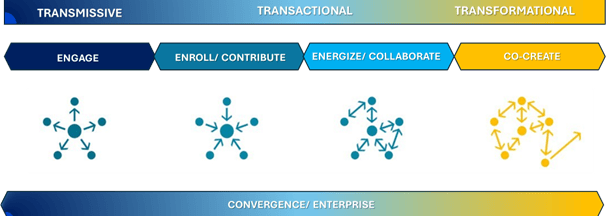
















Community Engagement and Social Entrepreneurship (CESE) : The Social Impacter - A framework to create student champions to propel experiential learning and create connected communities for a better cause.
With the evolution of education and technology, the processes are becoming more complex and automated and hence the core of human civilization which is human empathy and touch is lacking in many aspects and is also reflected in the society in the terms of disoriented families, job dissatisfaction, crime rate, corruption, wars and much more. Therefore, not only the government but premium institutions like SRMAP have taken the initiative to integrate the philosophy of Community Engagement and Social Entrepreneurship into the curriculum and other activities, to regenerate the symbiotic web of human communities and life.
With this broad-reaching emphasis on community engagement and involvement of students from an early age so that they can integrate and assimilate the concepts and core values at an early age and hence be the building blocks of the envisioned India. The entire theme of CESE has been very thoughtfully divided into 4 blocks – each block will cater to a specific set of students with specific learning outcomes spread across their academic years – where the concept will itself evolve, starting from the student’s 1st year of academic studies.


The CESE Participation Model describes four modes of member engagement that can occur within a community – ENGAGE, ENROLL/ CONTRIBUTE, ENERGIZE/ COLLABORATE, and CO-CREATE - and one that can occur both inside and outside of it: CONVERGENCE/ ENTERPRISE. All modes may be present at once, with some members interacting in multiple modes - or a community may have member engagement that falls into only some of the modes described.
In this short guide, we outline what each of the modes looks like and answer some frequently asked questions about the model. The model is shown in graphical form in Figure below.
Across the top you will see three forms of information flow: TRANSMISSIVE, TRANSACTIONAL, and TRANSFORMATIONAL. Below that, the four major modes of community participation, ENGAGE, ENROLL/ CONTRIBUTE, ENERGIZE/ COLLABORATE, and CO-CREATE. How these forms of information flow map onto the four modes are described in more detail below.


The entire student community will be segregated into 5 different houses based on their interest as well as to give them a focused approach to increase the depth and magnitude of a given segment and hence create the scope to study, understand, create projects, conduct research and explore the future career options in the same.
Social Innovation and Entrepreneurship
Global Community and Knowledge Connect
Each-one Teach-one
Student Activism for Environment
National Service Scheme (NSS)
Social Innovation and Entrepreneurship
Students housed at ‘Social Innovation and Entrepreneurship’ will have the opportunity to venture into society, identify problems and challenges and solve them through a structured project. The implementation/ design will be the final testimonial of their research findings and work. The solutions can be technical, non-technical or hybrid in nature. The identification of the challenges will be done in groups which will be validated by the leadership team. The activities are necessarily ‘in groups’ to encourage peer learning and teamwork. The approach can be as per the following levels:
Institutional level
Village level
Mandal or district level
State level
Global Community and Knowledge Connect
There is much that is happening across the world in the terms of community engagement and social entrepreneurship, which is very less known at the college or university level, as such a scope is not much provided in the academic dynamics. For example, there are thousands of projects and millions of people who are engaged actively with UNSDGs across the globe. Several organizations are involved directly and indirectly for such causes and have ample opportunities to engage the student community at various levels productively. And here it's an excellent opportunity for even the academia to collaborate and gain from such projects/ movements. Typically the students engages in Global Community and Knowledge Connect will be executing the following:
Social projects at the international level
Getting connected with other global student communities working for similar cause
Getting connected with global organizations into this arena and connect them locally
Floating social engagement programs for students of other countries as immersion and exchange programs
Hosting international conferences and workshops, and much more
Each-One Teach-One
There is not a very new initiative and there are several organizations EOTO India etc have done it at various levels with different impact levels. Yet when we look at rural India, the reach for even formal and proper education is missing. At the maximum, the government has supported primary and pre-primary schools in those regions which are very rote in nature and give a very basic literacy level to those masses. Hence an structured intervention of an education system which not only can bring the leadership skills but also the vocational skills out of an individual at that formative age of individuals.
The model here simply identifies the vocational, employability or entrepreneurial skills which are needed by an student to become employable or self reliant and creates a curriculum of 2 years where one to one weekly intervention is scheduled, with a little knowledge transfer and upskilling takes place and thereby impacting the students that rural in a huge manner. The curriculum is designed in such a way that it can be plugged into any other upskilling programs of the government or an organization naturally after the completion or can show the student a way to generate livelihood. A bunch of 400+ students are given a region with a detailed plan of execution. Volunteers and NGOs from outside can also be a part of the movement.
Student Activism for Environment (SAFE)
A club where from different domain come together to understand and impact the burning issues pertaining to the restoration of the mother earth and the environment, through well thought out initiative and activities, uniting other students communities from the vicinity, state and eventually from across the nation to create a movement and a high level of awareness in society.
The activities and initiatives are planned while leveraging the support system and resources available in society in the form of CSR, world-wide organizations like WHO, UNICEF and so on.
National Service Scheme (NSS)
The National Service Scheme (NSS) is a Central Sector Scheme of Government of India, Ministry of Youth Affairs & Sports. It provides opportunity to the student youth Technical Institution, Graduate & Post Graduate at colleges and University level of India to take part in various Government led community service activities & programs. The primary objective of developing the personality and character of the student youth through voluntary community service. ‘Education through Service’ is the purpose of the NSS.
The motto of the National Service Scheme is NOT ME BUT YOU.
